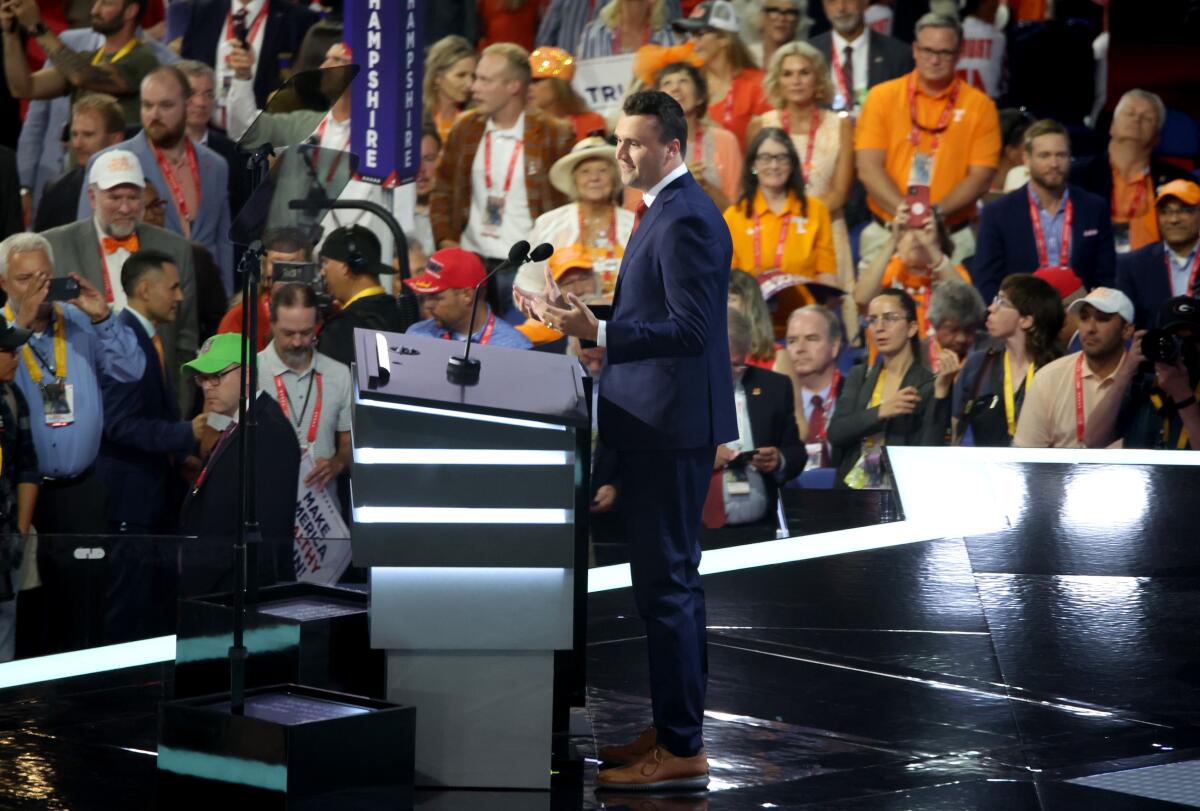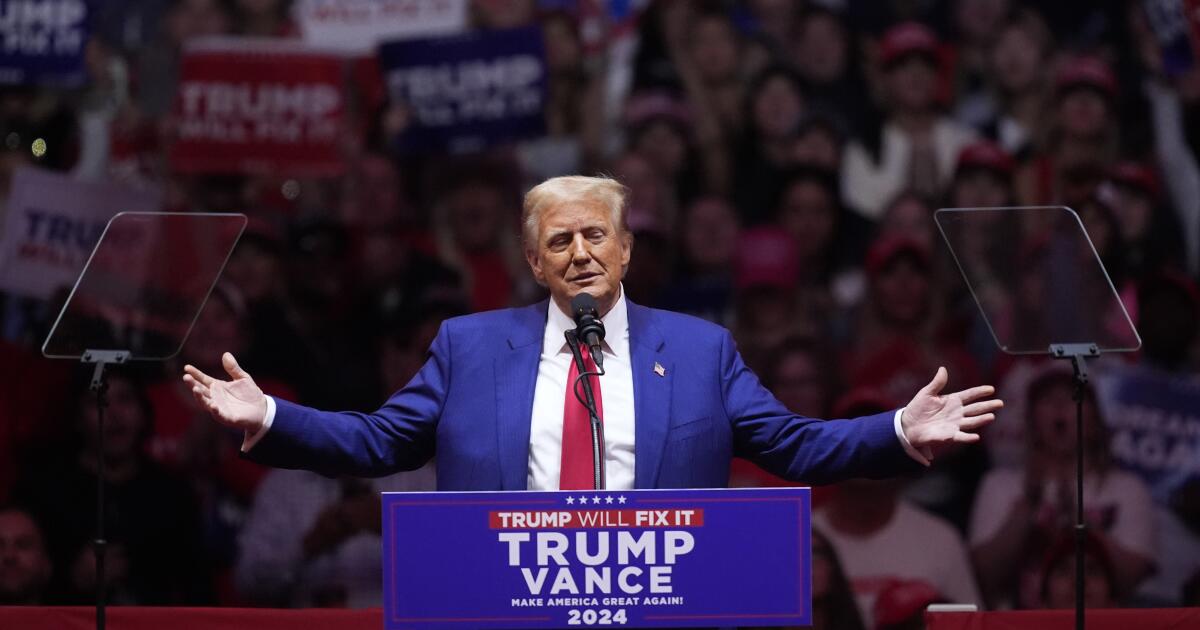After a video went on social media portraying him as a radical groomer endangering children with sexually explicit books, Frank Strong, a Texas teacher, received threats and became a target in a disquieting and toxic culture of rage and retribution shaped, he believes, by nearly a decade of Donald Trump’s political hold on the American imagination.
“It has a chilling effect,” Strong, a high school English teacher, said of the backlash he has endured in fighting to prevent schools from banning books on race and sexual identity. “I don’t know who these people are or what they’re capable of. This ugliness and sense of intimidation is a Trump era thing. There’s a real danger of it accelerating.”
Librarians are harassed, teachers vilified, election workers threatened. Immigrants are demonized and armed groups march outside state capitols. Even meteorologists are targeted in conspiracy theories.
“One election worker told me, ‘I can’t go to the grocery store without being seen as a pariah,’” Tammy Patrick, chief executive officer for programs at the National Assn. of Election Officials, said of the contempt Trump’s supporters have for the election system since he lost in 2020. “Another had to take their name off the mailbox at their family farm in Wisconsin because they feared threats from people coming from out of town. They have had that farm for five generations. A worker in Arizona had her dogs poisoned.”
Trump’s increasingly dark vision of America as evidenced by his recent hate-inflected rally at Madison Square Garden is less of unity and promise than of suspicion and grievance directed at those who cross him and his white, working-class base. He has so normalized outrageousness with coarse language and cutting asides that his pronouncements and well-documented lies — which years ago would have doomed a candidate — have lost their capacity to shock even some of the conservative Christians who back him.
He stands apart from any American president in history for what he’s doing to the country. He’s a destructive, corrosive force.
— William Howell, politics professor, on Donald Trump
“He’s speaking to anger and fear and giving voice to it,” said William Howell, a politics professor at the University of Chicago and co-author of “Presidents, Populism, and the Crisis of Democracy.” “He didn’t invent divisive rhetoric. We have a long history with that. But he’s taken it to new heights. He stands apart from any American president in history for what he’s doing to the country. He’s a destructive, corrosive force.”
A recent study by the Chicago Project on Security and Threats suggests how Trump has incited extremes and increased the potential for political violence: Six percent of Americans — the equivalent of 15 million adults — believe force is justified to return Trump to the White House. Eight percent — about 21 million adults — agree that force could be used to prevent Trump from returning as president.
Trump has said that “sometimes revenge can be justified.” He’s called for vengeance against political opponents, including President Biden, and suggested that retired Gen. Mark A. Milley, former chairman of the Joint Chiefs of Staff, deserved to be executed.
Republicans have sought to soften such sentiment by describing it more as campaign rhapsodizing than actual intent. Sen. Marco Rubio (R-Fla.) told CNN in July that “Donald Trump has been the one that’s been very clear: that his vengeance is going to be by winning and making America great again. Not going after his political opponents.”
Trump has been described as a fascist by John Kelly, his former chief of staff. He at times sounds like a newsreel from 1930s Germany, calling his enemies “vermin” and “sick people” and claims immigrants are “poisoning the blood of our country.” He invokes gangster Al Capone and speaks fondly of authoritarians including Russian President Vladimir Putin and Saudi Crown Prince Mohammed bin Salman who Trump called “a friend of mine.” The CIA concluded that while Trump was in office in 2018 Salman ordered the murder of opposition journalist Jamal Khashoggi.
Impeached twice and a convicted felon who faces more trials, Trump has said that he, and by extension his loyalists, have been persecuted by a “wacko” and unfair state. He is, according to the rambling narratives at his campaign stops, the antidote and protector of the working class. “In the end they’re not coming after me,” he tells his supporters, “they’re coming after you, and I’m just standing in the way.”
Since his campaign in 2016, Trump has inflamed American culture wars and played on the politics of the other. That strategy, which later propelled the deadly Jan. 6, 2021, attack on the Capitol, has been amplified of late by his calls that if reelected he would summon the military and Justice Department to put down the “enemy from within.”

Amanda Jones, a librarian in Denham Springs, La., has faced criticism for speaking out against censorship and book banning.
(Pablo Isaak Perez / For The Times)
Amanda Jones has felt that wrath. A Louisiana school librarian, she was harassed and threatened by right-wing elements after she spoke out against the censorship. She said she fears the vindictive atmosphere Trump has created.
“Our presidential election will determine how far it goes,” she said, adding that if Trump wins “it will ramp up hate. We’ll see a large flight of educators and librarians from their jobs. Trump’s made it OK for people to hate and attack. I noticed it right after the George Floyd protests. People started saying the quiet part out loud.”
Tucson Mayor Regina Romero said Trump’s repetition of hate speech against migrants over the years has added dangerous overtones to the nation’s immigration debate. “If you repeat lies long enough people believe them,” said Romero, a Democrat and daughter of immigrant farmworkers from Mexico. “It’s a very scary type of language. … It’s not an invasion [of migrants]. It’s racist rhetoric.”
Trump and his loyalists have taken particular aim at discrediting the nation’s election system. Republicans have filed dozens of lawsuits to preemptively challenge the Nov. 5 election if Trump loses.
The trouble, said Patrick, is coming from a “vocal minority that wants to suck the oxygen out of the room and sow chaos.” She added that election officials have received ominous texts and phone calls, including one in which a voice said, “I know your son’s window is on the second floor by the oak tree.”
Trump sought retribution against those who opposed him during his presidency, including former FBI Director James B. Comey, and has vowed to do so again if reelected.
“This is how fascism comes to America, not with jackboots and salutes,” Robert Kagan, a political commentator and former editor-at-large for the Washington Post, wrote in 2016, “but with a television huckster, a phony billionaire, a textbook egomaniac.”
By the time Trump had glided down his golden escalator to announce his candidacy a year earlier, the nation was accustomed to rancor and sharpening divisions. The rise of Christian nationalism in the 1980s, the government shutdowns in the 1990s, the emergence of the tea party in the 2000s, along with an atomized and increasingly partisan media, fueled a politics of recrimination and discontent. An unabashed showman, Trump plugged into the digital age, connecting the vitriol of social media to the insecurities and fears of a working class that felt angry and betrayed by liberalism and a changing global economic order.
“It’s a populist, anti-establishment era. It’s about defining who you’re against and undermining that at a time when life is very transformative,” said Mike Madrid, a longtime political consultant and co-founder of the anti-Trump Lincoln Project. “By pitting people against one another, if you are shameless enough, you will ultimately win. Trump is a product and articulator of his time. He’s treating the presidency like a social media influencer, not a presidential candidate.”

Charlie Kirk, co-founder of Turning Point USA, speaks during the 2024 Republican National Convention in Milwaukee in July.
(Jason Armond/Los Angeles Times)
In another podcast in April, Kirk said a number of Trump allies and advisors, including Peter Navarro and Stephen K. Bannon, have been imprisoned unfairly by a Justice Department weaponized by Democrats. “If the other side is willing to put you in jail and put leg irons on you and put handcuffs on you and our side is only willing to write op-eds, we will lose,” he said. “It’s time for us to start to use handcuffs and leg irons too.”
Such is the fierce tenor of the Trump campaign.
“What will it look like if Trump is elected?” asked Howell, the politics professor. “He has promised retribution. This isn’t about comprehensive policy. It will be an all-out assault on the administrative state.” He’ll lay claim to the Justice Department, Howell said, and seek vengeance against those who he believes have done him wrong.
Strong, the teacher from Texas, said he has been struck over the last two years by right-wing vehemence directed at educators opposed to banning certain books on race and sexuality. His Texas Freedom to Read Project monitors censorship attempts in school districts.
“What astounded me,” said Strong, who lives in Austin, “was the organization, amount of money and the vitriol behind book banning campaigns. It’s been incredibly nasty.”
Such vitriol, Strong said, is part of the atmosphere of the times. “Trump rode into power with a sense that it was culturally permissible to be horrible to other people in public.”






